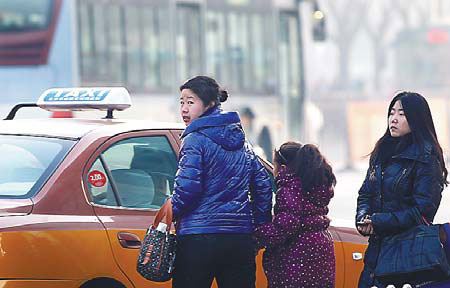Advisers call for policies on taxis to be loosened
|
Commuters battle for taxis during the morning rush hour in Beijing's Dongzhimen area on Jan 16. The capital has 66,000 taxis on its roads. Zou Hong / China Daily |
Political advisers called for the loosening of taxi policies and introducing a reservation system to ease the difficulty of hailing a taxi in Beijing.
Liu Zihua, a member of the Beijing committee of the Chinese People's Political Consultative Conference, said the government should consider introducing a system of taxi reservations, as the difficulty in calling a taxi has become a new source of public outcry.
"Different from the traditional taxi, the reserved taxi does not pick up passengers on the roads but only receives those who have reserved in advance," he said.
The cost and expenses of the new taxi system should be studied further and be based mainly on the route and how far in advance the customer makes the reservation, he said.
Liu said the taxi reservation system could relieve those who live in the suburbs, where there are few taxis around, and those whose private vehicles are not allowed on the roads due to traffic restrictions on certain days.
In addition, the system could also help curb the number of private cars.
Many residents have to buy a car because it's hard for them to get public transportation, but they do not necessarily use the vehicle that often, he said.
Liu Ning, another political adviser in Beijing, said the difficulty in taking a cab also has to do with how the government views transportation.
Taxis were considered high-end alternative transportation in the city some 20 years ago, however, it's time to review the role that taxis play in the city's transportation, he said.
"As the charge for taking a taxi has barely increased in the past few years and the price for other commodities has drastically increased, we should consider it more as public transport and increase the number of taxis," Liu said.
Only when the government further opens up the policy for operating a taxi can the problem be solved, he said.
Many people are blaming unlicensed taxis for disturbing the market order, but the fact that illegal cabs are common in the city shows that demand for taxis is huge.
"It is estimated there are as many illegal vehicles as licensed ones," he said.
Beijing had a total of 66,000 taxis last year and the number did not change for a decade, according to a Beijing Daily report in August. During the 12th Five-Year Plan (2011-15), the number of taxis will be maintained at the current level, according to the Beijing Commission of Transport.
Many taxi drivers have complained about hard work and low returns.
Feng Qiang, a taxi driver in Beijing, said he feels wronged to be a taxi driver.
"To run a taxi during the morning peak hours is really like doing public welfare, as you can only earn some 20 yuan ($3.20) for a drive of 40 minutes," he said. "Taking into consideration the price of oil, which keeps rising, you simply don't earn a cent."
In addition, as severe weather sees more traffic accidents, a small rear-ender will cost a whole day's work.
"Taxi drivers also need to be breadwinners for the whole family," he said.
Traffic has become a hot topic as Beijing's lawmakers and political advisers gather for their annual meetings this week.
Beijing will try to tackle the illegal taxi problem and improve taxi management, according to a government work report published at the opening of the annual session of the Beijing Municipal People's Congress, the city's top legislature.
In 2013, the capital's transportation department will make sure the percentage of people taking public transport can reach 46 percent. It will start construction of four new subway lines, the report said on Tuesday.
During the session, some deputies suggested that Beijing should connect the pricing system for public transport to incomes and inflation.
However, Zhang Gong, Beijing's deputy mayor, said on Wednesday that the city will continue the current system of low prices for public transport, which was launched in 2007, Beijing Times reported.
A reform of the pricing system for public transport will be further investigated, he said.
Jin Haixing contributed to this story.
zhengxin@chinadaily.com.cn



















